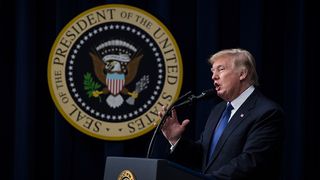Guilty verdicts. Guilty pleas. Immunity. It was an eventful week in the judicial system for people associated with the Trump campaign, as investigations into the corruption and criminality of that campaign move forward.
For Donald Trump, it was a particularly bad week. That’s because Michael Cohen, Trump’s former lawyer who pleaded guilty to violating campaign finance law, implicated Trump in the decision to pay off two women who claimed to have had affairs with the president. And Cohen has the tapes to back it up.
Rather than encouraging impeachment hopes or fears, last week’s verdicts should serve as a reminder of just how unlikely Trump’s removal from office actually is.
With Trump directly implicated in campaign violations – and with Robert Mueller’s Russia investigation continuing to claim scalps – talk of impeachment has forcefully returned. But rather than encouraging impeachment hopes or fears, last week’s verdicts should serve as a reminder of just how unlikely Trump’s removal from office actually is.
The go-to analogy for those eyeing impeachment is Watergate. In January 1974, the first of Richard Nixon’s campaign aides pleaded guilty. Other indictments and trials followed, and by August of that year, Nixon had resigned. Following that timeline, Trump would be out of office by next spring.
But there are reasons to doubt the Watergate analogy. For one, other presidents have faced similarly dire circumstances and managed to avoid any real consequences.
When the Iran-Contra scandal broke, Ronald Reagan’s presidency was in genuine jeopardy. The scandal involved violations of US law, secret arms deals, a massive foreign policy scandal, and destruction of evidence. After Congress passed a law forbidding US aid to the right-wing rebellion in Nicaragua, Reagan’s team sought to funnel money to the Contras by other means. So they sold arms to Iran, which the US had designated a state sponsor of terrorism, in exchange for the release of seven US hostages.
Given how tightly the Republican Party clings to Donald Trump (even though no loyalty flows from Trump to the GOP), the political nature of impeachment ensures that, at least for now, impeachment is entirely off the table.
It was a breathtaking abuse of power. The special counsel assigned to investigate eventually brought indictments against 14 people and secured 11 convictions (which would ultimately be wiped away through appeals and presidential pardons). But even though Reagan had more than two years left in his second term at the time the scandal broke, the impact on his presidency was limited. His approval ratings briefly dropped, then quickly rebounded. And though Democrats held both houses of Congress by the start of 1987, no impeachment proceedings followed – despite congressional hearings that found Reagan “ultimately responsible” for the scandal.
Iran-Contra is especially important to remember these days, because the temptation to draw Watergate parallels is strong, particularly given that it suggests that presidential lawbreaking ends only one way: in resignation. Reagan’s experience shows that simply isn’t the case.
The convictions and pleas and immunities served up last week should serve as a caution in another sense as well. Throughout Trump’s first 18 months in office, the only reliable check on the administration’s legal and ethical violations has been the courts.
Impeachment 101: The history, process and prospect of a Trump impeachment

When Trump first instituted the Muslim ban, it was lawyers and judges who thwarted him. When Trump sought to end DACA, a program for undocumented immigrants brought into the US as children, a federal judge ruled against him. His calls for everything from stricter libel laws to locking up Hillary Clinton have gone unfulfilled, precisely because the judicial system offers him no way to move forward.
Here’s why that is bad news for proponents of impeachment. First, the courts are starting to soften on Trump. The third iteration of the travel ban won approval from a Supreme Court that decided Trump’s words – his declarations of intent and motives – don’t really matter. Yes, Trump had said he wanted to ban all Muslims from entering the country, but since the executive order did not achieve that, the ban was constitutional. Given that the courts are the one venue where words really should matter, that is a troubling development.
Second, impeachment isn’t a legal process. Though it’s framed as such – articles of impeachment are filed and voted on in the House, and a trial is conducted by the Senate – there are no real legal norms involved. The key violations, “high crimes and misdemeanours", have no formal definition, and the judges are not dispassionate officials but fierce partisans.
Impeachment is instead a political process, and given how tightly the Republican Party clings to Donald Trump (even though no loyalty flows from Trump to the GOP), the political nature of impeachment ensures that, at least for now, impeachment is entirely off the table. Especially because, in recent days, Republican officials have become more deferential to Trump, not less.
Case in point: Lindsay Graham, a Republican senator from South Carolina, once swore that if Trump fired Attorney General Jeff Sessions (who, in recusing himself from the Russia investigation, has become a roadblock to Trump ending that investigation), “there will be holy hell to pay”. Yet on Thursday, Graham relented, saying Sessions would be out sooner rather than later.
The convictions and pleas delivered last week get us closer to understanding the nature of crime within the Trump enterprise, and how much his campaign was a piece of that. But it does not, for now, get us any closer to impeachment.






